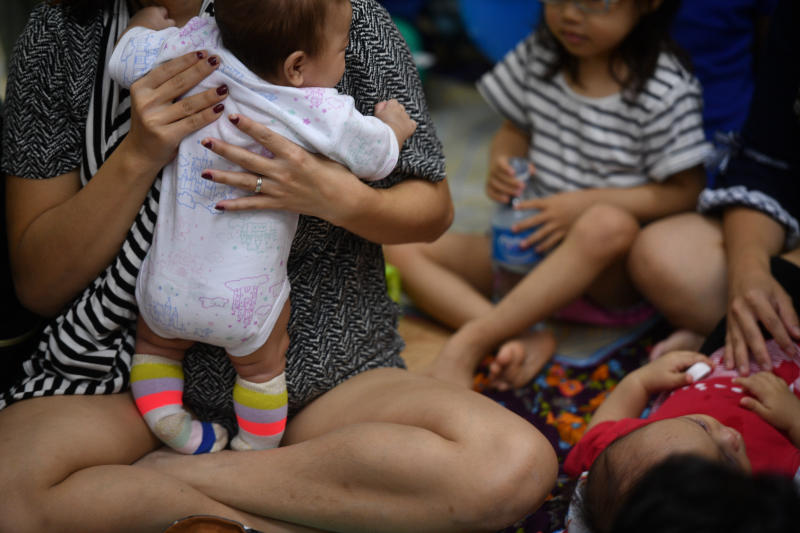How can Covid-19 affect pregnancy and childbirth?
Sign up now: Get ST's newsletters delivered to your inbox

A guide to safe pregnancy and delivery during the pandemic has been launched.
PHOTO: ST FILE
SINGAPORE - Unsure about having babies because of Covid-19 or concerned about its effect on pregnancy?
A guide to safe pregnancy and delivery during the pandemic was launched on Thursday (Dec 3) by the Academy of Medicine Singapore, College of Obstetricians and Gynaecologists Singapore, as well as the Obstetrical and Gynaecological Society of Singapore.
Developed by specialists in obstetrics and gynaecology from both public and private sectors, it provides answers to common concerns about parenthood in the new normal.
The Straits Times highlights some of these.
Q: How can Covid-19 affect my pregnancy?
A: An infected mother can have no symptoms or has very mild symptoms. More serious symptoms include shortness of breath, high fever and confusion.
If a mother becomes very unwell, there is a possibility that the illness may cause a miscarriage or premature labour.
In such a situation, doctors may recommend for the baby to be delivered as this may help the mother's heart and lungs.
These possible complications are why pregnant women with serious infections or illnesses need to be admitted for observation to ensure prompt treatment and expert intervention.
There is no evidence of increased stillbirth, neonatal death or a higher risk of babies developing abnormalities among women with Covid-19. There is also insufficient evidence about the risk of miscarriage or growth restriction of the foetus.
Q: What happens if I get infected by Covid-19 during my pregnancy?
A: You will be admitted for close monitoring in a separate ward and will be cared for by a multi-disciplinary team of healthcare professionals.
Procedures that are safe in pregnancy, such as blood tests and chest X-rays, may be performed.
Your oxygen levels will also be closely monitored and if required, supplemental oxygen will be given.
Medication may also be provided to those with more severe infection.
Q: Will it be more difficult for pregnant women to recover from Covid-19?
A: In Singapore, all the mothers who have been infected by Covid-19 have made a full recovery and continued their pregnancies uneventfully as at Thursday ( Dec 3).
A small proportion of infected mothers may require oxygen supplementation and intensive unit care.
Pregnant women with a greater risk of complications are those who are older, obese or have pre-existing medical conditions like diabetes and hypertension.
Q: Can the virus be transmitted from the mother to the baby in the womb or upon birth?
A: There is a small chance of Covid-19 infection passing from the mother to the baby in the womb or upon birth through vertical transmission.
In the event of transmission, most infected babies recover well.
None of the babies born to mothers with Covid-19 in Singapore has been infected.
Q: How does the delivery process differ for pregnant women who are infected with Covid-19?
A: Latest studies show that the rate of Covid-19 infection for newborns is no greater with vaginal deliveries compared to caesarean deliveries.
Mothers are looked after by a medical team in full personal protective equipment.
On top of the usual vitals, oxygen saturation will be monitored and oxygen therapy will be given if necessary.
Epidural analgesia would be considered if a caesarean section is required.
The team will also discuss with the mother depending on her medical condition and preference about whether she should be separated from her baby after delivery.
Mothers will generally be supported to breastfeed if they and their babies are well.
Q: Do newborns have a higher risk of contracting Covid-19 and how can I keep my baby safe?
A: Based on current information, babies do not have an increased risk of Covid-19 infection. Studies have also shown that the rate of infection is not greater when the baby remains with the mother or if the baby is breastfed with proper infection control practices in place.
Evidence has shown that there is no active replicating virus in breast milk, so Covid-19 positive mothers can continue to breastfeed.
They should still exercise caution by wearing a mask and maintaining good personal hygiene while breastfeeding to reduce the risk of transmission.
In some situations, mothers may also express their milk to be given to the baby by a carer.
Q: Should I wait for the pandemic to be over before starting fertility treatment?
A: There is no need to wait as precautions are undertaken in Singapore's hospitals through strict screening and preventive policies such as safe distancing measures.
Waiting indefinitely can also reduce your chances of pregnancy as fertility for a woman diminishes with age, especially after she turns 35.
However, the Covid-19 situation is fluid so some fertility treatments might be interrupted if the situation in Singapore worsens.
More information can be found at the Academy of Medicine Singapore's website.


